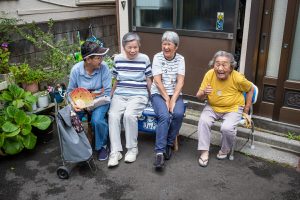Today, I am stepping away from the FUBAR disaster that has occurred during the past several weeks in Afghanistan, to something “completely different,” as they used to say on the old Monty Python TV show.
Instead of Afghanistan, I am taking you to Japan, where there is a national holiday called “Keirōnohi” (敬老の日). That’s “Respect for the Aged Day” for all you non-Japanese speakers.
Japan may be the only nation in the world that actually has created a national holiday to honor and respect its older generations. It is held on the third Monday of September each year.
I spent almost 10 years in Japan as the Chicago Tribune’s Tokyo Bureau chief and Far Eastern Correspondent. During that time I can recall seeing Japanese families spending time together in parks, in hotels and ryokans for family lunches and dinners, or just strolling through Tokyo’s ubiquitous neighborhoods.
This unique holiday began in 1947, in a small town in Hyōgo Prefecture now known as Taka. The town proclaimed September 15th to be “Old Folks’ Day” (Toshiyori no Hi). Through the years, the holiday’s popularity spread to every corner of the country.
By 1966 it was proclaimed a national public holiday and was still celebrated on September 15th. Beginning in 1998, Japan introduced the “Happy Monday System.” This system moved public holidays to Mondays so people with 9-to-5, Monday-to-Friday jobs could have more three-day weekends. In 2003, Respect for the Aged Day was moved to the third Monday of September.
Japanese who have grandparents or elderly parents have the opportunity to make the day special by taking them out for a meal or simply by spending time together. Even if they can’t be together in person, they can still give them a call and let them know how much they care and are missed.
Japan’s population has the greatest life expectancy in the world, with an average of 82.6 years (79.0 for men and 86.1 for women). According to recent statistics published by the Japanese Ministry of Health, this year the number of people 100 years old or older surpassed 40.000, with 86.5% of them women.
The oldest man in Japan is 112 years old and lives in Kyoto Prefecture south of Tokyo, while the oldest woman is 114 years and lives in Okinawa.
The secret to longevity in Japan is likely the healthy Japanese diet, which is low in foods containing heart-damaging trans fats and sodium and high in fresh vegetables and fatty fish such as salmon, fresh tuna, mackerel, sardines, and herring that are a great source of heart-healthy omega-3 fatty acids.

In addition, Japanese people have the lowest obesity rate in the developed world — 3%–versus 11% for the French and 32% for Americans, according to the International Obesity Task Force. This is not a genetic trait, say dietary experts, because when Japanese people adopt a Western-style diet heavy in red meat, fast foods, and fried foods, they put on weight quickly.
Still, studies show that the average Japanese adult eats about 25% fewer calories per day than the average American, which could partly explain their lengthy lifespan.
But another reason just may be the way elderly Japanese are treated in Japan’s tradition-rich society. When we used to walk through our Japanese neighborhood in the Fukazawa area of Tokyo, we frequently saw grandparents living with their children and grandchildren—often in traditional Japanese-style houses that were less than 1,000 square feet in size.
While such extended family lifestyles are not as common in Japan as they once were, there is nevertheless an unmistakable reverence for those 70 and older—especially in smaller cities and villages where the pace of life is much slower.
It is always risky to generalize about entire nations and ethnicities. Even so, I always felt that the Japanese treated their aging folks with greater regard and veneration than almost any other place I have visited or lived.
That impression is reflected in Japan’s Respect for the Aged Day, which is all about respecting and appreciating your elders.
That’s a mindset that seems to be missing in America’s youth-obsessed, self-indulgent culture where the elderly are often shunted off to nursing homes or confined to geriatric facilities which I consider nothing more than warehouses for the dying.




